|
|
|
Sort Order |
|
|
|
Items / Page
|
|
|
|
|
|
|
| Srl | Item |
| 1 |
ID:
153784


|
|
|
|
|
| Summary/Abstract |
Studies of property rights overwhelmingly focus on whether states expropriate or protect property, overlooking the crucial issue of whether private sector actors will use state institutions. By contrast, I argue that the “supply” of formal legal institutions often fails to ensure firms will rely on the state for property rights protection. Instead, firms frequently avoid formal legal institutions and turn to illegal strategies based on violence or corruption. Whether firms adopt legal strategies depends on: (1) firm-level practices and beliefs that impede the use of law, (2) the effectiveness of illegal strategies, and (3) coordination problems resulting from firms’ expectations about each other’s strategies. Drawing on interviews with firms, lawyers, and private security agencies, as well as an original survey of Russian enterprises, I illustrate how “demand-side” factors led to a surprising increase in Russian firms’ reliance on formal legal institutions over the past two decades. The findings suggest that comprehensive understanding of property rights and the rule of law requires not only attention to state institutions’ effectiveness, but also to private actors’ strategies.
|
|
|
|
|
|
|
|
|
|
|
|
|
|
|
|
| 2 |
ID:
148718
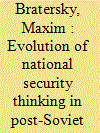

|
|
|
|
|
| Summary/Abstract |
This article contributes to the rich body of literature on Russian security perceptions and analyses how Russian security thinking evolved over the last 20 years. The focus of the article is on how Russian security perspective shifted from the goal of assuring Russian security by integration and cooperation with the West to the idea of Russia’s own separate geo-economic project and the goal of reducing the country’s dependencies on the West. Security in this article is understood both as a military-political and as an economic phenomenon.
|
|
|
|
|
|
|
|
|
|
|
|
|
|
|
|
| 3 |
ID:
148716


|
|
|
|
|
| Summary/Abstract |
This article examines the difficult search for identity in modern Russia amid debate over its future development. It explores practices in such countries as China and Germany, which have successfully adapted national identity to the need for modernisation and effective development in a new historical environment. The article analyses the risks that stem from Russia’s inclination towards focusing on the past and absolutising the factor of space. Finally, the piece offers suggestions on how to forge Russia’s new identity.
|
|
|
|
|
|
|
|
|
|
|
|
|
|
|
|
| 4 |
ID:
170598
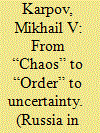

|
|
|
|
|
| Summary/Abstract |
The article describes how social and political changes in post-Soviet Russia over the past quarter of a century have been read and assessed by Chinese experts in relevant fundamental monographs. Each of the monographs considered herein, published in China twelve years apart, reviews different stages in the evolution of Chinese experts’ approach towards Russia, and states their analytical, ideological and political conclusions. Generally speaking, China’s sociopolitical Russian studies have evolved from the ideologically motivated resentment against the Soviet Union’s dissolution, the disbandment of its Communist Party and the ensuing shock reforms of the 1990s to the recognition of irreversible changes in Russia and “legitimization” of the Russian leadership in the 2000s-2010s. However, by the end of the current decade, the topic of uncertainty about Russia’s future sociopolitical and economic development has once again surfaced in some key publications along with increasingly “panegyrical” assessments of the Russian president.
|
|
|
|
|
|
|
|
|
|
|
|
|
|
|
|
| 5 |
ID:
071316
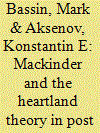

|
|
|
|
|
| Publication |
2006.
|
| Summary/Abstract |
This paper considers the ways in which Halford Mackinder's ideas are represented and mobilized in geopolitical discourses in post-Soviet Russia. Mackinder is broadly recognized as the most important proponent of 'classical' geopolitics, and his teachings about the Pivot of History and Heartland are referred to in virtually all geopolitical texts. Not all of this attention however is positive. We examine the very different ways in which Mackinder is deployed in this literature, and how he is re-signified to make his ideas relevant for contemporary Russia
|
|
|
|
|
|
|
|
|
|
|
|
|
|
|
|
| 6 |
ID:
105235


|
|
|
|
|
| Publication |
2011.
|
| Summary/Abstract |
This article investigates the various conditions, external and internal, that have determined the contemporary conscription policies of Russia, and what conditions must exist should authorities desire to move toward an all-volunteer force. It starts with a brief examination of the historical background behind current Russian conscription policy, and later looks at contemporary Russian attitudes toward service and the institution of the army. Concerns regarding Russian national security posture and fiscal constraints are then addressed. Despite a shift in mentality among Russia's top leaders as to the orientation of their army's posture, real fiscal conditions limit the implementation of many reforms, including a shift to a more contractual and voluntary form of recruitment. Furthermore, the harsh conditions and sometimes criminal climate that populates Russian units serves as a real deterrent to attract qualified soldiers. Not only do current political sensitivities inhibit further reform, but also it is the culture amidst the army itself that needs modernization. For now, any transition to a more contractual and voluntary form of recruitment will depend on more favorable fiscal conditions and political will to transform age old Russian military climate into one founded on basic respect for others.
|
|
|
|
|
|
|
|
|
|
|
|
|
|
|
|
| 7 |
ID:
102712


|
|
|
| 8 |
ID:
152142
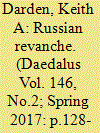

|
|
|
|
|
| Summary/Abstract |
Has the development of post-Soviet Russia in an international system dominated by a democracy-promoting United States bred an authoritarian reaction in Russia as a response to perceived threats from the West? Beginning with the NATO bombing of Yugoslavia in 1999, Russian elites have increasingly seen the United States as a distinctively threatening power, one with a strategy to exploit civic organizations, ethnic groups, and other forms of domestic pluralism as “fifth columns” in an effort to overthrow unfriendly regimes. With each new crisis in U.S.-Russian relations – Ukraine 2004, Georgia 2008, Ukraine 2014 – the Russian leadership has tightened controls over society, the press, and the state. The result is that the United States’ muscular promotion of democracy abroad has produced the opposite of its intended effect on Russia, leading successive Russian governments to balance the perceived threat from the United States by pursuing greater military and intelligence capacity to intervene abroad, and by tightening internal authoritarian controls at home to prevent foreign exploitation of the nascent internal pluralism that emerged in the wake of Communism.
|
|
|
|
|
|
|
|
|
|
|
|
|
|
|
|
| 9 |
ID:
143804


|
|
|
|
|
| Summary/Abstract |
Focusing on the Soviet system of scientific and technical cooperation, the study analyses the structures and agency created on the basis of scientific–technical cooperation during the Cold War. The essay introduces a model of the process of East–West interaction based on agency created through scientific and technical cooperation. By encompassing a long temporal trajectory, the essay suggests that it is possible to recognise similar practices and continuities in the modernisation project in contemporary Russia.
|
|
|
|
|
|
|
|
|
|
|
|
|
|
|
|
| 10 |
ID:
145505
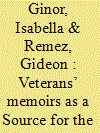

|
|
|
|
|
| Summary/Abstract |
Shortly before and after the USSR’s demise, a new literature emerged: memoirs by veterans of the Soviet Union’s massive military intervention in the Arab-Israeli conflict in the 1960s and ’70s. Resurgent Russian pride, coupled with condemnation of its corruption by Soviet crimes, permitted startling disclosures. Tools we developed to evaluate these sources found them remarkably reliable and necessitated a reassessment of existing historiography. The Putin administration marked a reversal. Russian nationalism now stressed continuity with the USSR’s great-power status. ‘Falsification of history against Russian interests’ was criminalized. Some veterans resorted to purported ‘fiction’, which if challenged could be disclaimed. But under even stricter scrutiny, these narratives generally proved to reflect the authors’ actual experience, providing significant pointers for further research.
|
|
|
|
|
|
|
|
|
|
|
|
|
|
|
|
|
|
|
|
|